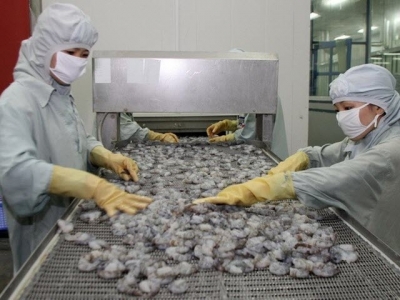Vietnam bolsters agricultural exports amid growing protectionism

Vietnam bolsters agricultural exports amid growing protectionism. (Photo: VNA)
Hanoi (VNA) - Vietnam is working to accelerate agricultural exports as growing global protectionism has impacted international trade and export of Vietnamese staples.
Rough seas for Vietnamese agricultural products
To protect its domestic catfish industry, the US Department of Commerce decided to levy duties of 3.87 USD per kilogramme for Vietnamese tra fish. This is the highest tax rate ever applied for Vietnamese frozen catfish fillets, making it difficult for local exporters to access the US market.
According to Truong Dinh Hoe, General Secretary of Vietnam Association of Seafood Exporters and Producers (VASEP), Vietnamese shrimp and fish have been taxed at an unfair anti-dumping rate since 2003 when Vietnam’s seafood exports only reached 1-2 billion USD a year.
Other seafood products like tra fish and tuna have been subjected to rigorous scrutiny before they are allowed to reach US consumers. Tra fish is examined from breeding, harvesting to processing and export processes under the catfish examination programme carried out from August, 2017.
Meanwhile, tuna product must receive a “dolphin safe” label from the Earth Island Institute before entering the US.
Taking effect from the outset of this year, the US National Oceanic and Atmospheric Administration’s Seafood Import Monitoring Programme sets out reporting and recordkeeping requirements for 13 imported seafood products, which was said to prevent illegal, unreported and unregulated (IUU)-caught seafood from coming to the US.
The US has filed 25 anti-dumping petitions on Vietnamese products so far, said Chu Thang Trung, deputy director of the Trade Remedies Authority of Vietnam under the Ministry of Industry and Trade. As most Vietnamese small-medium sized firms lack experience in safeguard measures, they may face fierce competition and lose market share.
Apart from seafood, Vietnam also experienced stagnant exports of pepper beans to India, the second largest importer of Vietnamese pepper. The Indian government has prohibited pepper imports to protect local farmers since the end of March.
In other markets, technical standards and high quality requirement for products have been billed as major barriers for exports.
Responding measures
According to Vietnamese trade counsellor in the EU and Belgium Nguyen Canh Cuong, foreign experts should be invited to help local businesses improve technical standards.
At the 2018 Trade Counsellor Conference held in Ho Chi Minh City in the beginning of the year, Cuong highlighted that the experts have huge impact on the behaviours of the consumers in their countries and will serve as effective “media ambassadors” for the Vietnamese goods.
Meanwhile, Hoe believed that besides negative influence, protectionism sets better standards for quality and food safety and hygiene. Thus, it is a must for Vietnamese to enhance food safety measures and improve quality to overcome technical barriers.
Le Nguyen Hoa, Vice Chairman of NutiFood JSC, said that studies of market taste and investment in production chains are crucial for any business that wants to gain a foothold overseas.
Trung recommended Vietnamese exporters study trade policies in foreign markets and create good relations with their partners to forecast trade risks.
“Petitions will leave significant losses for both businesses and the whole sector. Thus, enterprises should join hands to take advantage of market opportunities and have timely response to trade breakdowns”, Trung noted.
Có thể bạn quan tâm
 ‘New-style’ Sóc Trăng cooperatives yields higher profits for farmers
‘New-style’ Sóc Trăng cooperatives yields higher profits for farmers Agricultural cooperatives applying Vietnamese good agricultural practices (VietGAP) in Sóc Trăng Province are offering sustainable incomes for member farmers.
 A Hydroponic Rooftop Farm Grows in the Bronx
A Hydroponic Rooftop Farm Grows in the Bronx A soil-based system can weigh up to 40 pounds per square foot too heavy for many roofs a hydroponic system weighs approximately 8 pounds per square foot
 Vietnam rice exports to China drop
Vietnam rice exports to China drop Vietnam’s rice export sector is showing signs of reducing its dependence on China with other markets picking up the slack